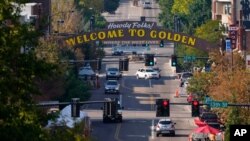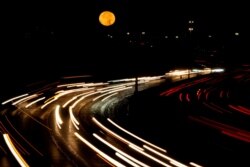Locked down or just staying close to home, people have been driving much less in the United States during the coronavirus pandemic. But while this may be six months of good news for the environment, businesses like hotels, service stations and tourist destinations are hurting.
According to the Federal Highway Administration, compared to the same time last year, total driving decreased by 40% in April soon after the pandemic emerged.
Recently, as more people have been getting back into their vehicles, the group said driving increased so that as of July, total kilometers are down only 11% compared to 2019.
Ruth Cody, who lives in Alexandria, Virginia, is among the millions of Americans who have cut down on their driving. Cody said she and her husband have been doing “much less driving” because they can work from home. They also refrain from driving to stores and other businesses to help protect themselves from the coronavirus.
“We’re spending more time in our neighborhood and taking walks with our children instead of using our cars,” Cody said.
Rabi Abonour, a transportation researcher at the Natural Resources Defense Council, said people are also riding bikes and participating in outdoor activities that don’t leave a carbon footprint.
Abonour is working with a program that encourages officials of U.S. cities to promote various types of emissions-free transportation.
Carbon dioxide and other emissions from passenger vehicles are a major source of air pollution.
With fewer cars on the road, the air has been cleaner in many U.S. cities including notoriously smoggy Los Angeles, said Abonour.
He thinks the cleaner air won’t last long “because we already see levels of driving increasing across the country.”
“A pandemic is the worst possible way to reduce the emissions and improve the environment,” said climate and energy expert Constantine Samaras.
But the Carnegie Mellon University associate professor said he is hopeful about “the small impact” less driving is making on carbon dioxide levels.
“A lot of folks are saying, why can’t we have this all the time, we don’t need a pandemic to make this a reality,” Constantine said.
However, the decline in driving during the pandemic doesn’t just reflect more people working from home. It’s also the result of widespread unemployment, shuttered businesses, and other devastating economic consequences.
“Restaurants, hotels and other establishments are being impacted by people’s driving habits,” points out Adie Tomer, a fellow at the Brookings Institution who focuses on infrastructure.
Because people aren’t driving for business travel and are holding back on taking vacations, “the hotel industry is really struggling,” said Mark Muro, another Brookings fellow.
Many restaurants have not rebounded from the loss of diners, and people aren’t visiting some tourist attractions due to fears of getting the coronavirus from the crowds, said Tomer.
However, driving has picked up en route to destinations such as national parks and beaches, where visitors feel comfortable because they can social distance more easily, said Tori Emerson Barnes, executive vice president of public affairs and policy at the U.S. Travel Association.
And, with fewer vehicles on the road, the energy industry is suffering because drivers aren’t filling up their gas tanks as often as they did before the pandemic.
Due to the lack of demand, “Gasoline refineries around the country have been running at very reduced capacity rates,” said Marty Durbin, senior vice president of policy at the U.S. Chamber of Commerce.
Also feeling the lack of demand is the Highway Trust Fund, which allocates the fuel taxes collected at gas pumps to maintain U.S. highways and road infrastructure.
“The pandemic is, for sure, going to affect the amount of fuel taxes that the federal government and states are going to collect,” said Samaras.
And since “the need for fixing and deploying infrastructure is not going away,” he said, road maintenance is being put off and highway projects are not getting off the ground.





